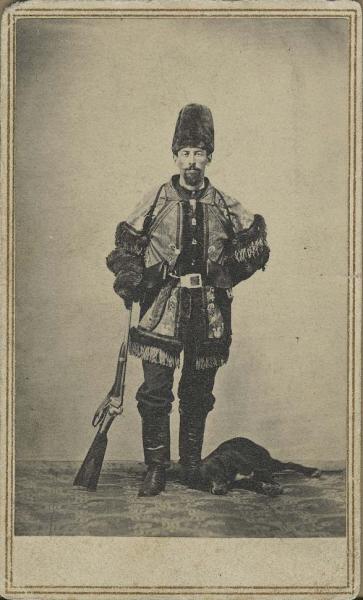By Christopher Phillips, University of Cincinnati
Biographical information:
- Date of birth: June 6, 1834
- Place of birth: Antwerp, New York
- Claim to fame: Colonel of Jennison's Jayhawkers (7th Kansas Volunteer Cavalry) and 15th Kansas Volunteer Cavalry, 1861-1864; fought in Price's Raid; served in Kansas House of Representatives, 1865-1869, and Kansas State Senate, 1872-1876
- Political affiliations: Republican Party
- Nickname: "Doc" Jennison
- Date of death: June 21, 1884
- Place of death: Leavenworth, Kansas
- Cause of death: Illness (Unknown)
- Final resting place: Greenwood Cemetery, Leavenworth, Kansas
Charles R. Jennison, abolitionist and federal cavalry colonel, was born on June 6, 1834, in Antwerp, in upstate New York’s famed “Burned-Over District,” so named for its fervid evangelical religious revivals that were foundational to Northern antislavery reform. In 1846, his family moved to Albany, in southern Wisconsin, where he studied and briefly practiced medicine. With an enclave of New Englanders and New Yorkers, the village was a hotbed of abolitionism. After a short stint in southwestern Minnesota, he moved his young family in 1857 to Osawatomie, Kansas, perhaps not coincidentally the home of John Brown, whose by then notorious radical politics Jennison would soon emulate.
Jennison frequently acted as a vigilante, including harassing a district court judge at Fort Scott for what he considered biased proslavery rulings.
Jennison moved to Mound City in 1857, where he affiliated with James Montgomery and participated in his jayhawking forays against proslavery residents in Kansas and Missouri. Jennison frequently acted as a vigilante, including harassing a district court judge at Fort Scott for what he considered biased proslavery rulings. But he did far more. On at least two different occasions, Jennison ordered proslavery men hanged under his direct leadership. The more widely known incident occurred on November 12, 1860, when Jennison’s posse “tried” and lynched Russell Hinds for capturing and returning escaped slaves to Missouri and accepting a small reimbursement.
In February 1861, Jennison was appointed captain of a local militia unit, the Mound City Guards, which was active patrolling the border counties south of Kansas City in the first months of the war. In late October 1861, with authorization from Governor Charles Robinson, Jennison mustered and organized the 7th Kansas Cavalry and commanded it as a newly commissioned lieutenant colonel. Owing to its hard-line tactics toward civilians in western Missouri, this regiment, which was soon known as “Jennison’s Jayhawkers,” would earn a reputation as perhaps the most extreme of those operating in the entire Trans-Mississippi theater.
“Jennison’s Jayhawkers” would earn a reputation as perhaps the most extreme of those operating in the entire Trans-Mississippi theater.
Jennison soon exceeded his authority to defend the Kansas border counties against General Sterling Price’s army, then positioned in central Missouri after the Battle of Lexington. Henry W. Halleck, the new commander of the Department of the Missouri, criticized Jennison for “cross[ing] the line, [to] rob, steal, plunder, and burn whatever they can lay their hands upon.” At Independence, Jennison arrested every adult male, admonished accused secessionists for their depredations against Unionists, and then after releasing them, kept the secessionists’ possessions, including slaves. He was soon accused of similarly plundering Missouri’s proslavery Unionists.
In April 1862, while stationed at Lawrence, Jennison learned that he and his controversial regiment had been ordered to New Mexico, an obvious ploy by the War Department to move them far away from Missouri slaveholders. Furious about this, as well as the perceived slight when James G. Blunt was promoted over Jennison to Kansas’s second brigadier-generalship, he resigned his army commission, and accused the Lincoln government of supporting slavery. Jennison was briefly arrested for encouraging his men to desert. For the next year and a half, he led a “red leg” militia unit.
In August 1863, William Quantrill’s raid on Lawrence, Kansas, prompted calls for retaliatory warfare against guerrillas and the civilians who supported them. Jennison’s hard-line reputation prompted Kansas Governor Thomas Carney to commission him a colonel in the state militia. This authorized Jennison to raise a regiment of cavalry, which he would lead for the next year, largely in the border district he now commanded.
During Price’s Raid in the fall of 1864, Jennison commanded a Kansas militia brigade that saw action at Little Blue, Independence, Westport, Marais des Cygnes, Mine Creek, and Newtonia. (Jennison’s former regiment, the 7th Kansas, had also returned to Missouri and fought against Price.) In December, after Price’s forces had retreated from Missouri, Jennison was again arrested for renewed jayhawking there. He was court-martialed, found guilty, and dismissed on June 23, 1865.
The triumphant postwar political climate in Kansas quickly revived Jennison’s sullied reputation. Having moved to Leavenworth, Kansas, in 1865, he served in the city council and as ex officio mayor. Later that year, he was elected to the Kansas House of Representatives and was reelected in 1867. In 1871, he was elected for one term to the Kansas Senate. He died at Leavenworth on June 21, 1884.
Suggested Reading:
Castel, Albert E. A Frontier State at War: Kansas 1861-1865. Ithaca: Cornell University Press, 1958.
Starr, Stephen Z. Jennison's Jayhawkers: A Civil War Cavalry Regiment and Its Commander. Baton Rouge: Louisiana State University Press, 1973.
Cite This Page:
Phillips, Christopher. "Jennison, Charles R." Civil War on the Western Border: The Missouri-Kansas Conflict, 1854-1865. The Kansas City Public Library. Accessed Saturday, April 20, 2024 - 09:48 at https://civilwaronthewesternborder.org/encyclopedia/jennison-charles-r


